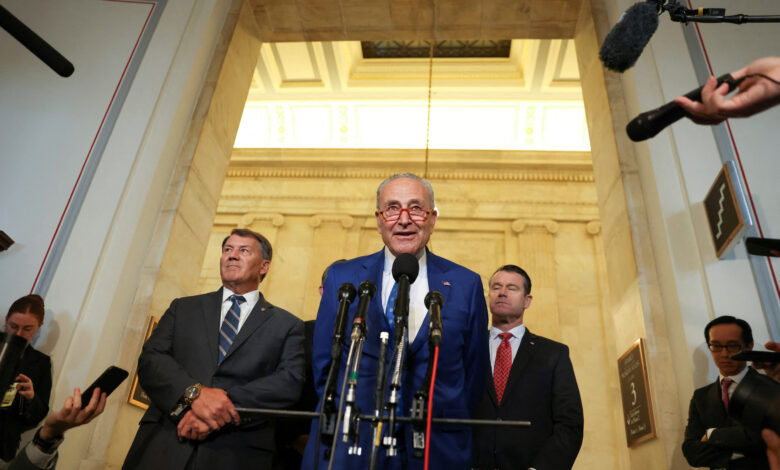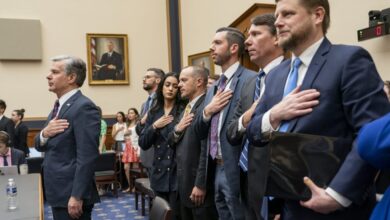AI and other technologies drive growing technophobia in the US: Congress and corporations must act

In a 1990 Harris Poll study of American opinion, 79% of respondents said they were concerned about threats to personal privacy.
The big problem back then? Caller ID.
When we recently posed the same question, 82% said the same thing – a modest 3% increase.
Today, however, a whopping 74% of Americans say technology is “almost out of control,” up from 45% in 1990.
What has changed? The constant rise of the Internet, social networks and now artificial intelligence.
Once novelties, mobile phones and personal computers have become ubiquitous.
Together with AI, they create an environment defined by devices and often guided by information that technology corporations silently collect from us.
Technological concerns, once the realm of imaginative pop culture (think “Metropolis,” “Blade Runner,” “The Matrix”), are now a hot topic in homes across America and on Capitol Hill.
Public officials are feeling concerns that Harris has documented: Nearly 80% of our respondents say they feel they have lost control over how their personal information is circulated and used, up from 71% in 1990.
That figure is 85% for baby boomers, the generation that has been most exposed to the evolution of technology in the last 30 years.
Technologies that are increasingly capable and difficult to evaluate drive the feeling of loss of control.
82% of our respondents agree that AI development is also a threat to people’s data privacy.
Other concerns are fueled by impassioned press reports that make it seem like AI could eat up our jobs while giving students and others tools that make them look much smarter and more productive.
Add to that the fact that we may not be able to determine what is made by machines and what comes from humans, and the effect of this technology is dizzying, if not fearsome.
Amid fear, Americans appear to trust legacy institutions more than before: The share of people who said they have little trust in credit agencies, for example, has dropped by half, from 39% to 18%, while that the number reporting high confidence has almost doubled, from 17% to 32%.
This change reflects the fact that it is easier for Americans to access information from credit bureaus to keep track of their scores.
Trust in many other legacy institutions (including the IRS) shows similar gains.
Meanwhile, our new survey found that Americans rank social media companies, search engines, and generative AI last in terms of trust, well below financial institutions and health insurance companies.
This makes sense because we all know that banks and health insurers are subject to reliable regulation, while social media and artificial intelligence operate in a Wild West environment where virtually anything goes.
Much of the unease comes from the unknown: the sense that tech companies are always lurking, collecting and disseminating consumers’ personal information without their knowledge or consent.
Consumers say they are more concerned about the security implications of their data than their personal safety, fearing that they won’t discover that their data is being misused or their identity is being stolen until the damage is done.
As good screenwriters have long known: the dangers you can’t see can be the scariest of all.
So where is technophobia headed?
It depends on the results in corporate boardrooms and in Congress.
In the short term, it is up to technology companies to better explain their products and make clear their commitments to privacy.
Companies like Apple and Google cannot simply produce products that serve as “tracking devices”; They need to add value to the consumers who rely on them, rather than exploiting their technology use for overly lucrative data collection.
Customers feel reassured, for example, when companies like Apple regularly announce new security features, such as private browsing in Safari, communications security, and lock mode.
To respond to consumer concerns, companies must realize that the commitment to privacy is not temporary; It is necessary to declare it, reformulate it and display it publicly on an ongoing basis.
However, in the long term, enacting data privacy legislation at the national level could also help keep our fears fueled by entertainment, not reality.
Eleven states, including California, Texas, and Virginia, have comprehensive data privacy laws, often addressing the protection of biometric identifiers and health data.
This year, Colorado officially affirmed five key rights for the state’s consumers: the right to access, the right to correct, the right to delete, the right to data portability, and the right to opt out.
The federal government can look to these 11 states for inspiration, implementing what works and ignoring what doesn’t.
Instead of a piecemeal approach to privacy, it is worth considering a more comprehensive framework, so that private companies are incentivized to follow suit.
In today’s America, technophobia is very real, but it can be used for productive purposes.
If business leaders and policymakers address and mitigate our fears properly, perhaps we can all watch “The Matrix” again in relative peace, with no strings attached.
Will Johnson serves as CEO of The Harris Poll, one of the world’s leading public opinion, market research and strategy firms.




